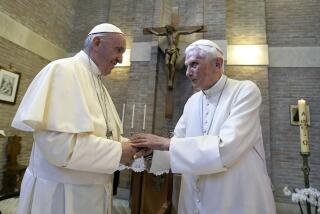Some cardinals share thoughts on papal conclave at Vatican City
VATICAN CITY — In their private meetings before electing the new pope, Roman Catholic cardinals took note when one of their members rose to speak — clearly, quietly and persuasively — about the need to purify the church and streamline its unwieldy bureaucracy.
Cardinal Jorge Mario Bergoglio seemed to sum up the very themes, problems and challenges the leaders were debating. He was forceful without being abrasive, one cardinal recalled Thursday.
By the time they strode solemnly into the magnificent Sistine Chapel and closed away the outside world on Tuesday, many of the cardinals had significantly refined their lists of candidates. Scarcely 24 hours later, on a fifth round of voting, at least 77 of 115 prelates had chosen the unassuming cardinal from Buenos Aires as the 266th pontiff.
The choice was historic — the first pope from the Americas and the first from a continent other than Europe in more than a millennium. The choice also stunned much of the public and many from the ranks of veteran Vatican watchers, almost none of whom predicted that Bergoglio would be elected to replace Pope Benedict XVI, who resigned last month.
The cardinals take an oath of secrecy that bars them from discussing in detail the proceedings that led to the election, but on Thursday some information began to emerge slowly, forming an illuminating, if partial, picture of what happened and how.
“Most of us had two or three candidates when we entered” the Sistine Chapel, Cardinal Juan Sandoval Iniguez of Mexico said in an interview. “We did not go in with our minds in blank.”
Cardinals often say it is the Holy Spirit that guides their vote in the conclave. But the real work — the trading of names and weighing of pros and cons — takes place in the days before the conclave, over pasta dinners and informal chats and, especially, in the congregations, as they are known — the meetings where cardinals speak, air grievances or outline plans and visions. For some, it is as close to a campaign speech as they get.
And while support coalesced around Bergoglio, other candidates may have peaked or failed to gain traction because of serious criticism by numerous cardinals of the Italian-dominated Vatican bureaucracy. The usually formidable voting muscle of the Italian bloc of cardinals was weakened by the so-called Vatileaks scandal that revealed alleged corruption and infighting in the Curia, as the bureaucracy is known. That might have hurt the chances of the archbishop of Milan, Cardinal Angelo Scola, who had frequently been mentioned as a possible front-runner.
Embarrassingly for the Italian clergy, its bishops’ conference sent a quick message of congratulations to the new pope that was addressed to Scola instead of Bergoglio.
In each of the five rounds of conclave balloting, votes for other candidates dropped off or shifted to Bergoglio until he received the majority needed, Sandoval said. One factor may have been the fact that Bergoglio came in second in the 2005 conclave that chose Benedict.
“Cardinal Bergoglio wouldn’t have become pope in the fifth ballot, if he had not been a really strong contender for the papacy from the beginning,” Austrian Cardinal Christoph Schoenborn told reporters.
ALSO:
Pope Francis, soccer fan, scores with Argentina media
Pope Francis, a New World pontiff, faces old challenges
Pope Francis delivers stern message to cardinals at Sistine Chapel
More to Read
Sign up for Essential California
The most important California stories and recommendations in your inbox every morning.
You may occasionally receive promotional content from the Los Angeles Times.











